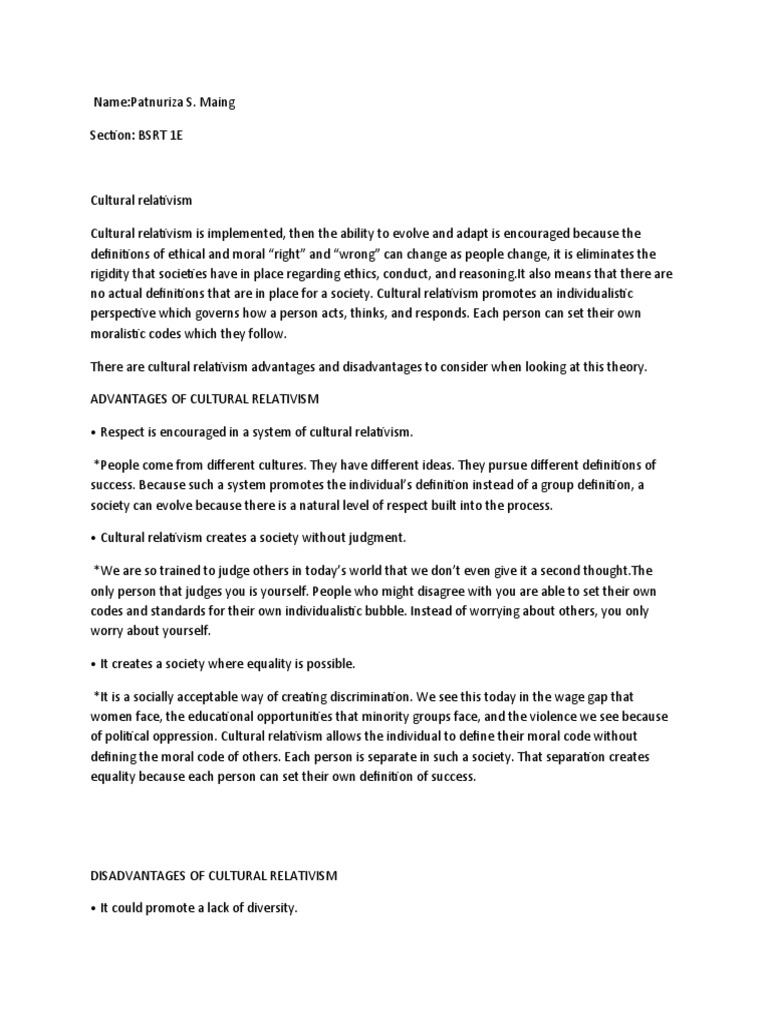Cultural relativism is often heralded as a way to foster understanding and tolerance among diverse societies. It posits that a person’s beliefs and practices should be understood based on that individual’s cultural context rather than judged against the standards of another culture. While this perspective has its merits, it also harbors a multitude of negative implications that can undermine moral accountability and perpetuate harmful practices. One might ask, is it possible that cultural relativism, in its attempt to cultivate respect for differences, sometimes engenders a blind eye toward injustice?
One of the most salient criticisms of cultural relativism arises from its potential to sanction ethical violations. Consider practices such as female genital mutilation (FGM), which exist in various cultures under the banner of tradition and ritual. Proponents of cultural relativism argue for an understanding of such practices within their cultural frameworks. However, this excuse often ignores the severe physical and psychological harm inflicted upon women and girls. By framing these practices as culturally significant, cultural relativism can inadvertently perpetuate systems of oppression and violence, stymying efforts for reform and evolution within those societies.
Moreover, the relativist perspective can lead to an ethical paralysis, where individuals and institutions refrain from intervening in what they perceive to be the cultural affairs of others. The case of human trafficking exemplifies this dilemma. In many regions, individuals may exploit others in ways that are accepted or overlooked due to cultural norms. Cultural relativism can thus obstruct activism and intervention efforts, as societies grapple with the conflict between respecting cultural practices and advocating for universal human rights. Should we remain passive in the face of such atrocities simply because they are culturally sanctioned?
One cannot overlook the role of cultural relativism in hindering global discourse on pressing issues like climate change. Different cultures can have vastly different relationships with nature and resource usage. For instance, some societies prioritize ecological sustainability, while others might engage in exploitative practices for economic gain or survival. Cultural relativism can complicate international environmental agreements, where negotiation and enforcement often clash with local customs and notions of progress. As climate change pervades all lives, does reserving judgment on detrimental environmental practices foster a collective inaction, threatening our planet’s future?
Furthermore, cultural relativism fosters an environment where harmful ideologies can thrive unchecked. In contexts such as honor killings, which are justified through cultural narratives, the relativist framework can lead to an abdication of responsibility. Such practices not only reflect a disdain for human rights but also occupy a paradoxical space where the demand for cultural preservation eclipses the imperative for human dignity. How should societies reconcile the sanctity of culture with the fundamental tenets of human rights? This question becomes even more essential as globalization promotes interconnectedness while simultaneously magnifying disparities.
The concept of moral absolutism counteracts these concerning tendencies. It maintains that certain ethical standards should universally apply, regardless of cultural context. An absolutist viewpoint asserts that practices such as child labor and discrimination are indefensible in any context. While adopting an absolutist perspective can lead to accusations of cultural imperialism, it can also provide a necessary counterbalance to the excesses of cultural relativism, prompting robust dialogues about ethics.
Another critical aspect to consider is the potential for cultural relativism to foster a ‘victim mentality’ among oppressed groups. When harmful practices are justified through cultural lenses, individuals from these cultures may feel disempowered or invalidated if they wish to challenge those practices. The belief that they must acquiesce to ingrained traditions can stifle initiatives toward reform or improvement. This dynamic leads to an oppressive mentality where agency is undermined, and the aspiration for progress is stifled. Shouldn’t every culture allow its members the right to aspire for betterment and development?
Even in more benign discussions surrounding cultural relativism, challenges arise when cultural dialogue borders on cultural appropriation. This situation often manifests in global cultures where popular elements of a marginalized culture are commodified without understanding their significance. Such appropriation can dilute authentic cultural expressions while simultaneously denying recognition and respect to the source community. This poses a question: when does cultural appreciation become cultural theft, and who decides the boundaries of that distinction?
It is also crucial to consider the implications of cultural relativism within the realm of education. If educators adopt a purely relativistic approach, they may inadvertently endorse ignorance over critical engagement. Teaching students that all cultural practices are equally valid can lead to a disregard for essential civic virtues and ethical truths that uphold a democratic society. This perspective may stifle critical thinking, reducing students’ ability to discern between practices that promote wellness and those that perpetuate harm.
As we navigate the complexities of cultural interactions in an increasingly globalized world, the pitfalls of cultural relativism should not be overlooked. Advocating for respect and understanding is vital, yet it should not come at the cost of accountability or progress. Societal change demands that we scrutinize practices that violate human dignity, regardless of their cultural origins, and forge pathways toward a more equitable and just world. Cultural relativism, while valuable in promoting tolerance, must be tempered with an unwavering commitment to human rights, environmental sustainability, and ethical accountability.
